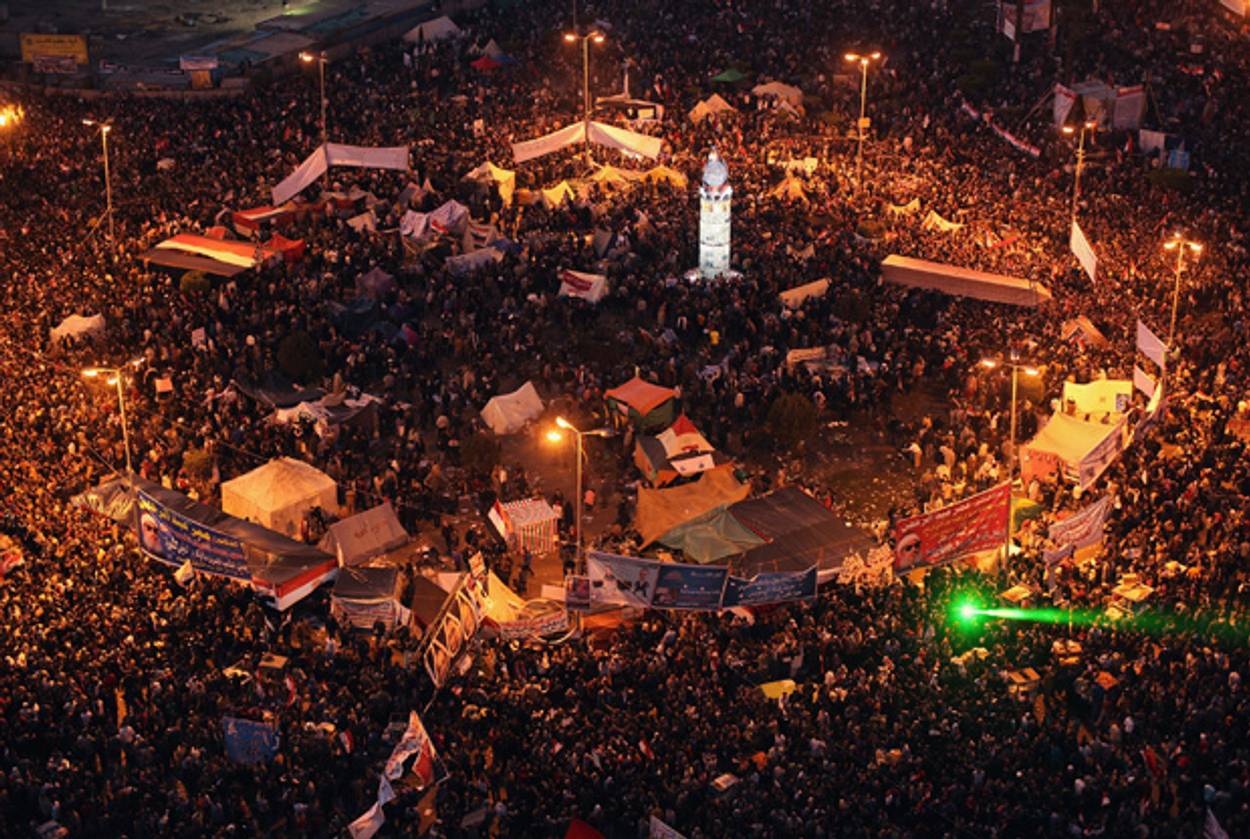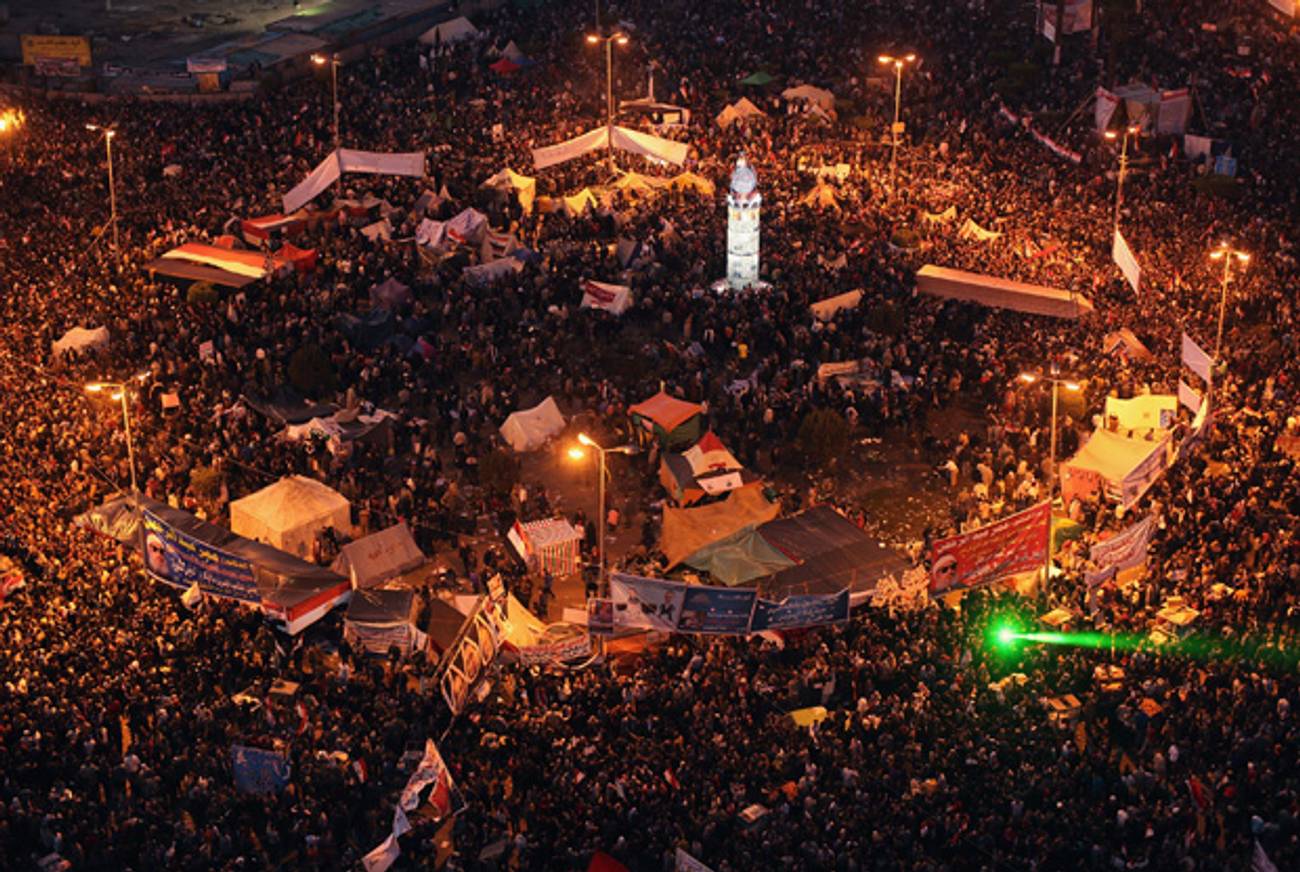A Muslim Brother Runs for President in Egypt
What are the implications for the U.S. and Israel?




Egypt was shaken up over the weekend when the Muslim Brotherhood, the largest and most venerable party, violated an earlier pledge not to run a presidential candidate when it became clear that, on one side, Abdel Moneim Abouh Fotouh, a more moderate Brotherhood apostate, and, on the other side, Hazem Salah Abu Ismail, an ultraconservative Salafist, were gaining traction before the May and June elections. Now, the Brotherhood’s candidate is longtime party treasurer and all-around macher Khairat el-Shater. For more insight into what exactly is going on in the Egyptian political scene, I spoke yesterday with the Council on Foreign Relations’ Steven A. Cook (who also published a helpful primer on el-Shater’s ostensible policy positions; also, here is Marc Lynch’s smart take). The interview has been edited for clarity.
Why is the fact that the Brotherhood is fielding a candidate such a big deal? It is a political party.
It’s a broader narrative about the Brotherhood and their desire not to run a presidential candidate, but then not finding one they could coalesce around, and then deciding on el-Shater. Some say this was their plan all along, and I think there is something to that. Having this opportunity after 80 years—it may have been too great to pass up. But they have been buffeted by a number of political developments over the past month and were forced.
Why did they pledge not to run a candidate in the first place?
Primarily out of political preservation. They have run into confrontation with the state, but they have also very often sought to prevent a head-on clash with the state. There was an idea that they could socialize themselves to Egyptians and the international community by not running a candidate. One thing to know about Islamist movements is that they believe they have time on their side, and it’s already been 80 years, and they’ve been making headway ever since, so, why go for it right now when it could put the organization in jeopardy?
But here they have a great opportunity. How could they pass it up? The pool is generally not up to standards, there’s no one they can coalesce around. Nobody knows for sure what triggered this. My sense is that there was the way the situation has been unfolding; the inability to find a candidate; the challenges of Aboul Fotouh and the Salafist; and a confluence of interest between Brotherhood and the military.
Where do the Brotherhood and the military have common ground?
They both want to prevent Abu Ismail from coming to power. The military has been looking for someone whom they can make a deal with. The military isn’t really ideological, it’s interested in securing its rights and prerogatives in the new Egypt.
And who else is a possibility? Yes, the Brotherhood is having a hard time adjusting, has had its own challenges. But at the same time it remains the most well-organized, best-resourced of any social movement in the country.
El-Shater has rivals to, effectively, his right and left. Which side is he more likely to move toward now?
This is the big question. There are a whole host of questions about what his views actually are. He has some conservative views and liberal views, sometimes on the same subject. For example, he’s called for more female participation … and also been a member of a study group that calls for religious segregation.
Now there’s going to be a debate about who speaks for Islam. One of the things we’re going to see is this dynamic between the Salafists and the Brotherhood. Those in the center of this debate tend to borrow the language or symbolism to shore up their Islamist credentials. There have been incidences where these Salafists have been proven not up to the task.
Who do you think is going to win?
It’s impossible to predict. But el-Shater is by definition the frontrunner given the resources at his disposal. Amr Moussa is definitely running—some Egyptians are saying it’s going to galvanize people to vote for Moussa. But none of them have the ground game the Brotherhood can muster.
Where will this likely leave Egypt’s relations with the United States and Israel?
There are very few political organizations committed to the U.S.-Egypt relationship the way it has been. The architecture is not something that has broad support in the Egyptian political arena. Those who espouse the ideas closest to ours is the Free Egyptians; smaller parties like the Democratic Front; a whole series of social-democratic parties. It’s not good politics.
Think about the background of the Brotherhood. One of their claims to fame is that they were the first to raise the alarm about the threat to Palestine. There’s Brotherhood lore about battling heroically alongside the Egyptian military in the 1948 war (which is not entirely true). They obviously have been consistent in their opposition to the peace treaty.
El-Shater has said he’s going to put pressure on countries that support Israel blindly, but they’re not in a position to break the treaty. Again, these are people who have been speaking out of both sides of their mouth on this. You can point to a variety of different statements.
If I were the Israelis, I’d be nervous.
What’s the best-case scenario?
If I were an American policymaker, the hope I would have is that whatever deal the Brotherhood struck with the military—if there was one—gave the military autonomy in this particular realm so that it calls the shots. Let the Brotherhood rail against it. That’s the best you can hope for. If there’s enough public opinion, they may not be able to uphold that credibly. There may be so much poltical pressure that the SCAF [Egypt’s military rulers] would need to change things. We really are in the realm of the unknown. For 30 years, it was so utterly predictable, and now nobody really knows because Egyptian politics have been scrambled.
Egypt’s Muslim Brotherhood Criticized for Presidential Candidate [WP]
Related: Egypt’s ‘Engineer’: A Look Under the Hood [CFR]
Marc Tracy is a staff writer at The New Republic, and was previously a staff writer at Tablet. He tweets @marcatracy.